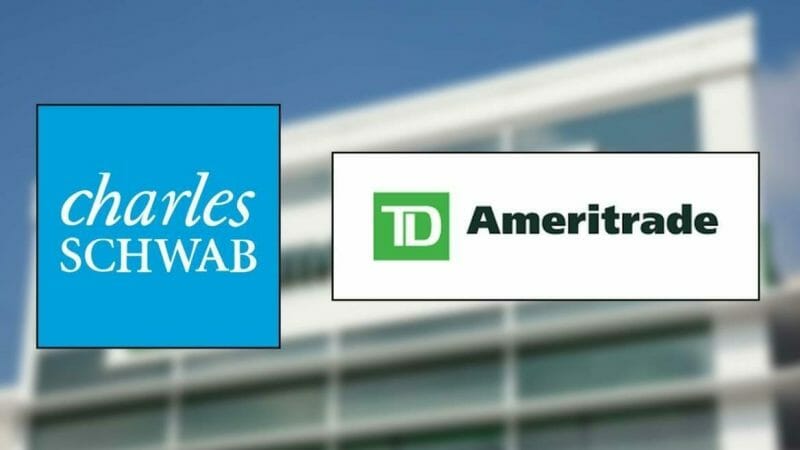Schwab buys TD Ameritrade
It’s final: Schwab will buy TD Ameritrade for $26 billion to emerge as a giant with almost $5 trillion in assets. There’s no such thing as a free lunch, but at least there’s free trading.
TD Ameritrade stockholders will get 1.0837 Schwab shares for each TD share, according to filings. This is a 17% premium based on the average share price as of the close on Nov. 20. The deal will add 12 million client accounts, $1.3 trillion in assets, and roughly $5 billion in revenue to Schwab’s existing business.
Schwab said in the statement that the new firm will have “the resources of a large financial services institution that will be uniquely positioned to serve the investment, trading and wealth management needs of investors across every phase of their financial journeys.”
I am actually amazed by the strategic moves that were made to achieve this merger. Schwab makes 7% of its revenue from its trading business, while TD makes 36% of its revenue from commissions. It was no surprise then that when Schwab eliminated commissions, stocks for both firms fell, but TD suffered a more severe hit! The result: Schwab got a major discount on the deal before TD eliminated commissions.
But I think the credit really goes here to Robinhood, that sort of changed the game in the discount brokerage business when it was a cool bay area tech startup to give its users free stock (and later options) trading back in 2013. The firm attempted to “disrupt” the financial services industry, but it made the majority of its money in the early days by selling order-flow data to hedge funds and recently has suffered some controversy when its glitch offered users an infinite amount of free money. Now, it makes money the way most brokerages do, by investing idle cash in consumers’ accounts and charging interest for margin accounts.
Now, the disrupter is being disrupted because other prominent players are doing the same thing, but better. If you’ve used TD’s thinkorswim platform, then you know that it is FAR superior to anything else out there on the market.
But, commissions aren’t the only way discount brokerages make money. Other sources of income include charging interest on margin accounts, and investing idle cash in accounts and obtaining a return better than the one it pays on the idle cash. For Schwab, this was 93% of their revenue stream, and with 12 million new accounts from TD, this will only improve.
I think the winner here is clear: Schwab. If you’re an investor in the US, then it’s also you, because you now have TD’s superior platform and execution at $0. The worst outcomes for this deal are not for competitors in the financial services area such as E*Trade or Vanguard, but tech-startup Robinhood.
Robinhood had the first-mover advantage in the space and acquired a decent market share of 6 million users, but now it might face a bigger churn as users opt for superior analytics, interest rates, and better execution by switching to competitively priced brokers, aka TD/Schwab.
So it was sort of obvious that Robinhood decided to enter the banking game when it decided to launch a debit card that offers 2.05% interest. Competition means eroding monopoly profits and creating a product that has at least the same number/quality of features as your competitor.
If Robinhood can figure out the math and make more money from idle cash in its accounts and through Robinhood Gold (margin account) subscriptions, it might just survive.
Trade Talks
China and the US have “reached consensus on properly resolving relevant issues” and agreed to stay in contact on the remaining points for a “phase one” trade deal.
Talks on the phase one deal have continued since October with both countries making concessions on various issues to reach an agreement. The markets are booming on trade optimism, and the S&P closed today at $ 3,133.64, up 0.75%.
The clock continues to tick, and the lack of a finalised deal before Dec. 15 will mean tariffs on $160 billion worth of imports. Phase one negotiations have become more complex now that the US legislature has passed a bill to support pro-democracy demonstrators in Hong Kong.
Trump said last week that a trade deal with China was “potentially very close” but it “can’t be like an even deal” because the U.S. is “starting off from the floor” and China is “already at the ceiling.”
China continues to insure itself, for the country could potentially be selling $6 billion worth of dollar-denominated bonds.
Alibaba’s Hong Kong Listing
Alibaba listed itself in the Hong Kong Exchange and rose to $188.10 HKD, up 6.88% on its first trading day, despite violent protests in the city.
Alibaba is one of Asia’s most valuable firms, and it raised about $11 billion in its Hong Kong offering, the largest issuance of stock since 2010. The Hong Kong Exchange has lost business to US exchanges as Chinese companies often prefer the liquidity and convenience of US exchanges.
The explicit takeaway here is that the firm raised some money in a major Asian city that is currently facing violent pro-democracy protests. The implicit takeaway here is that the firm is confident in the economic future of the city, and wants investors in Asia to invest in the firm.
Alibaba’s homecoming could draw other firms to make the same move, and more listings would improve liquidity on the Hong Kong exchange. As for the cash raise, Alibaba could use the money as it competes in Asian markets with Tencent and Baidu.


Leave a Reply